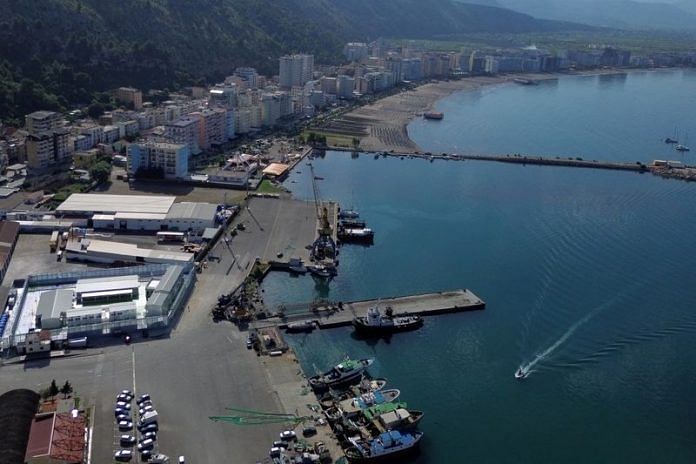By Crispian Balmer
ROME (Reuters) – Italian Prime Minister Giorgia Meloni will visit a site in Albania on Wednesday where her government plans to build a reception camp to house thousands of migrants picked up at sea.
Looking to curb migration to Italy, Meloni signed a deal with Albania last year to send some asylum-seekers to the Balkan country and process the asylum requests there.
Here are some facts about the plan.
WHAT IS IN THE DEAL?
The accord, agreed for an initial five years, foresees disembarking 36,000 migrants a year at the Albanian port of Shengjin, about 75 km (45 miles) south of the country’s capital, Tirana. Their cases will be processed at a centre being built at a nearby air base in Gjader, which can hold 3,000 people.
Both facilities will be staffed by Italian personnel and will operate under Italian jurisdiction. However, outside security will be provided by Albanian guards.
CAN ANY MIGRANT GET SENT TO ALBANIA?
No. Only those migrants who come from countries that Italy deems safe will be able to be processed in Albania. At present there are 21 such countries, recently increased from 15, including Bangladesh, Egypt, Ivory Coast and Tunisia. Last year, 56,588 migrants arrived in Italy from those four nations.
Meloni said last year that pregnant women, minors and other vulnerable people would not be sent to Albania.
HOW MUCH WILL IT COST?
The government has not yet provided a figure. Adding up the planned expenditure items from a report prepared by parliament and the state budget service, it could be 610 million euros ($663 million) between 2024 and 2028. Corriere della Sera, the most-read Italian daily, estimated it would cost 653 million euros.
HOW WILL IT WORK?
The idea is that selected migrants will be sent directly to Albania after they are picked up at sea. Meloni has said officials will endeavour to examine asylum requests within 28 days, much quicker than the months it currently takes in Italy.
Anyone whose request is accepted will be brought to Italy.
The vast majority of requests are expected to be rejected, because the countries the migrants come from are considered safe, which automatically limits the scope for asylum to be granted. Those whose requests are turned down will also be taken to Italy and put in holding centres until repatriation.
However, critics say this process is very slow because many countries refuse to take back citizens or impose limited numbers for returnees. Many migrants served with expulsion orders vanish from centres and disperse around Europe, living under the radar.
WHEN WILL IT START?
It was meant to start this month, but the buildings are not yet complete and Italian newspapers have speculated that the first migrants would not arrive until October of November.
WHAT DOES ITALY GET OUT OF THE DEAL?
Italian officials have said the deal could help relieve overcrowding at processing centres in Italy. Critics say it is aimed at dissuading migrants in Africa from putting out to sea for fear they will end up in Albania, which is not a member of the European Union and is not a wealthy country.
WHAT DOES ALBANIA GET OUT OF THE DEAL?
By helping out Meloni, the government in Tirana is securing her support as it pushes to become an EU member. It is also showing the rest of Europe that is willing to help the 27-nation bloc deal with one of its most intractable problems of recent years. Ordinary Albanians have also said it is a way of thanking Italy, which took in many thousands of Albanians fleeing poverty after the fall of communism in 1991.
HOW DOES IT DIFFER FROM BRITAIN’S DEAL WITH RWANDA?
Britain wants to send asylum seekers to Rwanda, but it is a very different plan from Italy’s initiative. One key difference is that migrants sent to Rwanda will need to stay in the central African country even if they win refugee status. Another difference is that, unlike Rwanda, those sent to Albania will be protected by the European Convention on Human Rights.
($1 = 0.9200 euros)
(Reporting by Crispian Balmer; Editing by Sriraj Kalluvila)
Disclaimer: This report is auto generated from the Reuters news service. ThePrint holds no responsibilty for its content.



